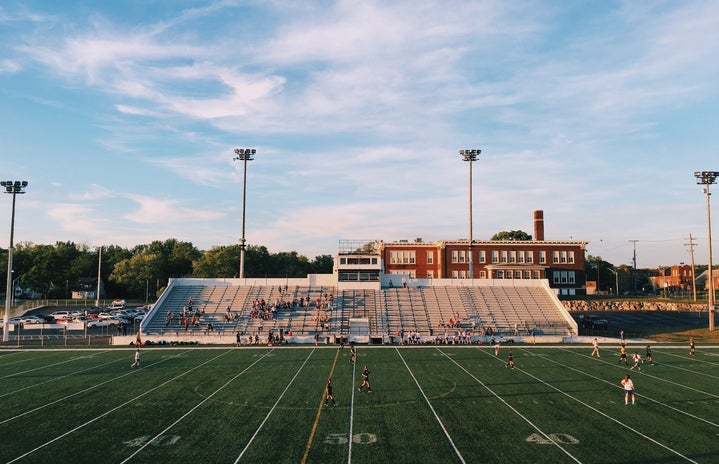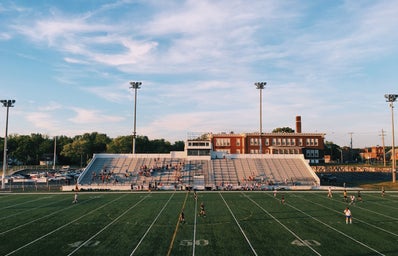I am no sports fanatic.
I could count on one hand the number of athletic teams I care to follow, and talk of trade deadlines and salary caps is enough to put me into a deep sleep.
As a Northeast Ohio native, knowledge of the Cleveland Cavaliers is something you can never fully escape. LeBron James is Akron’s hometown hero, and is a figure fully deserving of that title. His love for our community and his dedication to helping others succeed is unrivalled in the NBA. It is therefore pretty much impossible to ignore the sport that has helped give rise to LeBron’s status and that has put Cleveland on the map: basketball.
During June of 2016, all of Northeast Ohio—and the rest of the world, for that matter—watched as the Cavs overcame a 3-1 deficit in the finals to win the championship. Record-breaking parades were held in Cleveland, and it felt as though something truly remarkable had happened in the region. The 2017 NBA finals sadly did not go our way this time, and Cleveland’s rivals, the Golden State Warriors, took the title.
Like any good Cavs (LeBron) fan, I was disappointed to see this result play out. But as a person who is not completely sports-obsessed, I also realized that there are many other important issues to focus our energy on. Let it go and move on.
Still, there is one aspect of this year’s sports season that has been floating around in the back of my mind. It has nothing to do with actual games played or what the starting lineup looks like. Rather, it is a feature of the game that has its own unique essence. I’m talking about the tradition of the White House visit.
According to sports writer Thomas Neumann, the tradition of victorious sports teams visiting the White House began in 1865 with President Andrew Johnson inviting the Brooklyn Atlantics and the Washington Nationals amateur baseball clubs. Following that initial meeting, White House visits were sporadic throughout most of the 20th century. Ulysses S. Grant invited the first professional baseball team, the Cincinnati Red Stockings, in 1869. The 1924 Washington Senators are believed to have been the first World Series championship team to visit the White House after being asked by Calvin Coolidge. John F. Kennedy was the first to invite NBA team, the Boston Celtics, to the White House in 1963, and the first NCAA championship team to visit was Indiana University’s men’s basketball in 1976. The first Super Bowl championship team to visit was the Pittsburgh Steelers, who interestingly enough joined the World Series champions Pittsburgh Pirates in a dual ceremony with Jimmy Carter in 1980. Another Pittsburgh team, the Penguins, were the first Stanley Cup hockey champions to visit in 1991. Neumann says that it was Ronald Regan, though, who made the annual championship visit a regularity while in office in the 1980s.
Recent history has shown that about a dozen professional and top tier college teams have visited the White House since 2009, each meeting with President Obama and often participating in community service events in Washington. Teams have viewed the White House visit with deep respect and dignity, and for the past three decades, very few athletes have rejected the invitation to attend. This goes to show that despite personal political differences, sports teams have overwhelmingly deemed the visit an honor. The election of 2016, however, may have changed that outlook for at least the next few years.
There is no doubt that the November 8th election was contentious. Since the new administration took over in January of 2017, turbulent change has unsettled many Americans, and it’s difficult to find someone who doesn’t have an opinion on the state of our country. Athletes are citizens just as much as the next person, so it’s no surprise that some will have opinions regarding politics as well. The interesting aspect of this is that the disruptive nature of our new government has reached the very thing that we’ve believed politics couldn’t reach. Sports have often been somewhat of an escape for many viewers; the chance to kick back, zone out, and not worry about the day’s problems for an hour or so. Now, though, there is speculation over a team’s decision to visit the White House or to not.
What does it mean if a team, or a significant number of players, refuses to attend the White House visit? What are they standing for, or against? These are the types of questions that will indeed be asked each time a new team wins a championship. The New England Patriots won the Super Bowl this year, and their White House visit in April featured a significant number of players who chose not to attend. The Golden State Warriors have yet to make a decision, but based on past remarks from coach Steve Kerr and point guard Steph Curry, it does not seem like something they are eager to do.
A tradition that has been viewed throughout history as a light-hearted, celebratory event seems to have been unable to escape the politics of 2017. Much like every other aspect of our lives, the unstable political climate in which we live seems to seep into the things we most enjoy. Though I’m aware that my understanding of the sports world is limited, my understanding of humans and emotion is much more apt. It’s difficult to argue against an athlete or team’s decision to forgo an invitation to visit the White House this year, especially when considering the tumultuous setting we find ourselves and our country in. In making that choice, though, we can only hope that teams and individuals are considering the very people who cheer them on season after season; the ones who are affected by the decisions of the administration they may be visiting.


